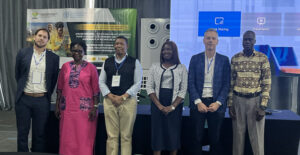
Statistical officials from Sub-Saharan Africa are advocating for the adoption of the Agricultural Sciences and Technology Indicators (ASTI), a globally recognized program designed to collect, compile, and analyze agricultural research data.
The officials emphasized that incorporating ASTI would enable Sub-Saharan countries to formulate effective policies and prioritize investments, ultimately boosting agricultural growth and productivity.
This call was made at the conclusion of a workshop aimed at raising awareness about ASTI, sharing lessons from pilot implementations, and equipping participants with the tools and knowledge necessary to harness its potential.
The workshop was co-organized by the Food and Agriculture Organization (FAO) and the West and Central African Council for Agricultural Research and Development (CORAF), in partnership with the Forum for Agricultural Research in Africa (FARA), the Association for Strengthening Agricultural Research in Eastern and Central Africa (ASARECA), and the Centre for Coordination of Agricultural Research and Development for Southern Africa (CCARDESA).
Baisti Podisi, Regional Programme Coordinator at CCARDESA, highlighted the region’s lag in generating agricultural data compared to other regions.
“It is one of the proven approaches that can showcase countries’ performance through the information they generate. This is especially important as countries in the region strive to boost productivity to feed their populations,” he said.
Dr. Wilhelmina Quaye, Director of the Science and Technology Policy Research Institute, emphasized the role of the new data collection approach in identifying gaps in agricultural capacity and infrastructure.
“For instance, using the new approach will help determine whether Ghana has sufficient infrastructure in the agriculture sector to drive productivity. If not, it will pinpoint which areas require strengthening,” she explained.
Dr. Emmanuel Njukwe, Director of Research and Innovation at CORAF, underscored the importance of the approach in addressing Africa’s food system challenges, particularly those arising from climate change.
“The data we are collecting is to guide the future. Foresighting and forecasting are essential to targeted planning. By understanding past trends, we can make informed decisions for the future,” he said.
Ms. Lwinya Kabosha Chishimba, a statistician at the Zambia Agriculture Institute, described the training as enlightening and empowering.
“I now have the tools to collect, analyze, and share data with policymakers to inform sound decisions. I will use this approach effectively for the benefit of my organization and my country,” she stated.
Mr. Hernán Daniel Muñoz, ASTI Project Leader at the FAO, noted that the workshop had provided participants with valuable technical insights into the ASTI methodology while introducing new approaches to researchers.
“The participants explored ways to leverage lessons learned from the pilots to foster deeper dialogues among national and regional stakeholders and promote national ownership of the program,” he said.
He added that the program seeks to identify the most effective models for data collection, tailored to the unique settings of each country, as past data collection efforts often lacked a standardized and official approach.
GNA